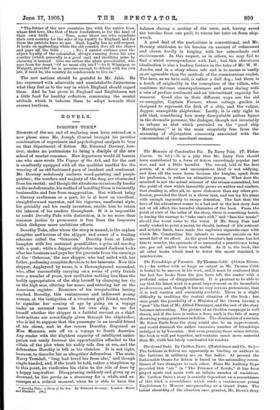NOVELS.
DOROTHY TIM.*
STORIES of the sea and of seafaring men have entered on a new phase since Mr. Joseph Conrad brought his peculiar combination of experience and psychological analysis to bear on that department of fiction. Mr. Edmund Downey, how- ever, makes no pretensions to being a disciple of the new school of marine romance. New departures would ill beseem one who once wrote The Voyage of the Ark, and for the rest is excellently equipped with all the qualities needful for the weaving of an old-fashioned yarn of incident and sentiment. Mr. Downey sedulously eschews word-painting and purple patches ; the wonders and majesty of the deep are eliminated from his recital; and though the situations occasionally border on the melodramatic, his method of handling them is eminently businesslike and free from exaggeration. But without being a literary craftsman or a poet, he is at least an excellent, straightforward narrator, and his vigorous, unaffected style, his geniality and his ready invention, enable him to retain the interest of his readers throughout. If it is impossible to credit Dorothy Take with distinction, it is no more than common justice to pronounce it free from the longueurs which disfigure more ambitious efforts.
Dorothy Take, after whom the story is named, is the orphan daughter and heiress of the skipper and owner of a trading schooner called the Octoroon.' Dorothy lives at Little- hampton with her maternal grandfather, a grim old sea-dog with a past; while a.dapper shipbroker named Jackson looks after her business and pays her the proceeds from the earnings of the ' Octoroon,' the new skipper, who had sailed with her father, professing complete devotion to her interests. Now this skipper, Appleyard by name, is a thoroughpaced scoundrel, who, after successfully carrying on a series of petty frauds over a number of years, now meditates nothing less than the bodily appropriation of the ship herself by changing her rig on the high seas, altering her name, and entering her on the American register. Rumours of his irregularities having reached. Dorothy, this venturesome and indiscreet young woman, at the instigation of a vivacious girl friend, resolves to signalise her coming of age by going on a voyage under an assumed name in her own ship, to see for herself whether the skipper is a faithful servant or a thief. Instructions are accordingly given through the shipbroker, who is led to suppose that the passenger is an invalid friend of his client, and in due course Dorothy, disguised as Miss Manners, sets off on a voyage to South America. Any reader with the slightest capacity of intelligent antici- pation can easily forecast the opportunities afforded to the villain of the plot when his sickly wife dies at sea, and the defenceless Dorothy is left in his clutches. It is not right, however, to describe her as altogether defenceless. The mate, Harry Trendall, " long had loved her. from afar," and though single-handed, and, if the truth be told, rather a simpleton up to this point, be vindicates his claim to the role of hero by a happy inspiration. Disappearing suddenly and given up as drowned, he lies perdu, as a stowaway for a while, and re. emerges at a critical moment, when he is able to turn the
* Dorothy Take a Story of the Sea. By Edmund Downey. London : Hurst and Blackett. Os.]
balance during a mutiny of the crew, and, having saved the heroine from one peril, to rescue her later on from ship- wreck.
A good deal of the portraiture is conventional, and Mr.. Downey attributes to his heroine an amount of refinement and charm hardly in keeping with her antecedents and environment. In this respect, as in others, we may fail to find a strict correspondence with fact; but this chivalrous idealisation is also a leading feature in the tales of Mr. W. W. Jacobs, and in a story whose sole end is to amuse is vastly more agreeable than the methods of the conscientious realist. The hero, as we have said, is rather a dull dog ; but there is a touch of originality in the conception of the villain, who combines extreme unscrupulousness and great daring with a vein of profuse sentiment and an intermittent capacity for remorse. Good also in their different ways are the old. ex-smuggler, Captain Farmer, whose cottage garden is designed to represent the deck of a ship, and the vulgar, dapper, susceptible shipbroker. Lastly, it is only right to add that, considering how many disreputable sailors figure in the dramatis personae, the dialogue, though not invariably so urbane as that which prevailed on the " good ship Mantelpiece,'" is in the main singularly free from the seasoning of objurgation commonly associated with the conversation of the merchant seaman.






































 Previous page
Previous page